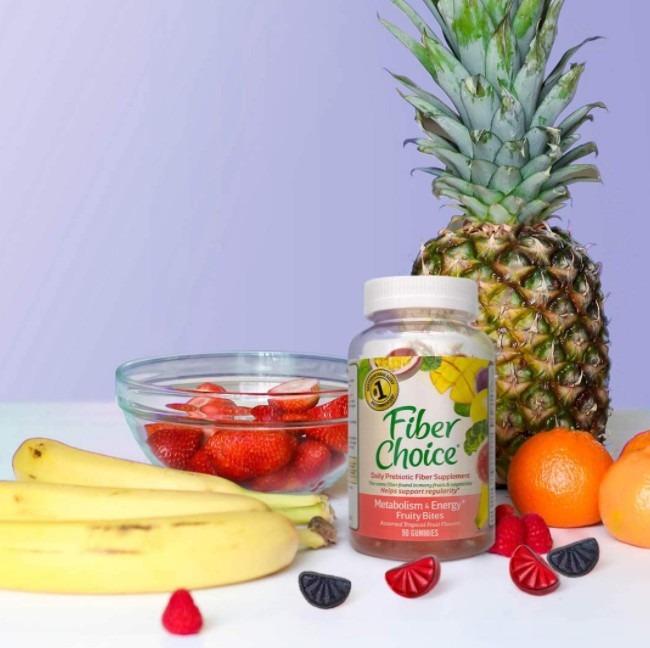Dietary fibers are an incredibly essential part of our diet, which are of two types: soluble and insoluble fibers. They offer a wide range of health benefits. It is mostly left undigested in the stomach and is transferred to the colon, where it acts as a prebiotic, promoting the growth of healthy gut bacteria.
Fiber helps maintain healthy digestion by keeping the bowel movements soft and regular. It also prevents the risk of heart diseases, promotes weight loss, lowers cholesterol, and maintains blood sugar levels. There are many other benefits of incorporating the right kind of natural fiber into your diet.
To know more about the health benefits and types of fibers, check out this article: The Reality behind Fiber – Real vs. Fake.
The recommended daily intake of fiber is 28 grams for women and 38 grams for men. Regardless of all the benefits, most people do not even meet half of the recommended daily intake of fibers. That is why; they don’t come anywhere close to getting the benefits of this important nutrient.
To increase your fiber intake, we recommend sticking to natural sources such as fruits, vegetables, legumes, whole grains, nuts, and seeds.
If you aren’t eating or getting enough fiber from food, a great alternative to increase your fiber intake is through supplements. But supplements might not give you all the health benefits, and they also come with a lot of side effects.
This article will help you decide whether fiber supplements are good for you, or are you better off without them.
Do You Need Supplements?

Fiber supplements are available in a variety of different dosage forms, from powders to chewable tablets. They seem to be the most convenient way of consumption. Fiber supplements give short-term relief from constipation and bowel irregularity. They are also used in weight management because they keep you full for longer.
Talking about side effects, these supplements interact with other drugs like aspirin and warfarin, and they induce gas and bloating. Eating natural fibers helps you consume a lot of other vitamins and minerals. Supplements do not help with preventing heart diseases. They do not provide the same amount of benefits when compared to a high-fiber diet, and they don’t compensate for poor eating habits.
In short, fibers in supplements do not provide the same health benefits. Most fiber supplements are used only to prevent constipation and have no other pros. You don’t need supplements when there are many tasty, natural sources available. But the final decision to go for supplements is up to you.
Types of Fiber Supplements
Fiber supplements are of different types. It is best to consult your doctor first before consuming supplements to find out which one is the best for you. These supplements are a combination of soluble and insoluble fibers. They also have faux fibers, which can be from a natural or synthetic source.
The best fiber supplements include:
Inulin
Inulin is a natural extracted fiber, which is a great probiotic. Inulin mainly consists of soluble fibers, and it can be found in a chewable tablet form, with a fiber content of 3 grams per 2 tablets.
Methyl Cellulose
Cellulose is a type of sugar found in plant cells. It is a common soluble fiber. It is non-fermentable, meaning it does not induce bloating or gas. It is available in a powder and caplet form, with a fiber content of 2 grams per 1 tablespoon of powder and 1 gram per 2 caplets.
Psyllium
Also called ispaghula, Psyllium is made from the husk of Plantago plants. It has 70% soluble and 30% insoluble fibers. It slows digestion, helps increase fullness, and lowers bad cholesterol. This supplement is the most efficient in maintaining digestive health and regularity. Moreover, it eases painful symptoms of irritable bowel syndrome and hemorrhoids.
It is available in capsule and powder form, with a fiber content of 6 grams per 2 tablespoons of powder and 2 grams per 5 capsules.
Wheat dextrin
Wheat dextrin is a byproduct of wheat that contains only soluble fibers. It helps regulate digestion and maintain blood sugar in type 2 diabetes. Wheat dextrin is also gluten-free. It is available in powder form, with a fiber content of 3 grams per 2 teaspoons.
Other fiber supplements include lignin, pectin, gum, polydextrose, and polyols.
Health Benefits of Fiber Supplements

Normalizes and Improves Bowel Movements
A study shows that fiber softens and increases the size and weight of the stool, making it easier to pass and reducing the likelihood of constipation. Fiber that absorbs water and adds bulk to the stool may also help solidify loose, watery stools. Therefore, a fiber-rich diet can help with constipation, diarrhea, irritable bowel syndrome, hemorrhoids, and diverticulosis. It also lowers the risk of these conditions and colorectal cancer.
Let’s break this down:
Diarrhea
A study proves that soluble fiber absorbs water as it passes through the digestive tract, converting it into a jelly-like substance, especially useful in treating diarrhea.
Constipation
Insoluble fiber softens and accumulates stools, making them easier to pass. This helps relieve constipation and prevent the formation of hemorrhoids and fissures in the anus caused by solid feces, as proven by research.
Helpful in IBS and IBD
A study on fiber supplements proves that they can also be used to treat Irritable Bowel Syndrome (IBS) and Inflammatory bowel diseases (IBD) like Crohn’s disease and ulcerative colitis. But it should be used after consulting the health care provider.
Helps Improve Heart Health
According to an umbrella review study, fiber supplements can help lower total blood cholesterol levels by dropping the amount of LDL cholesterol in your blood system. A high-fiber diet can also help reduce inflammation and blood pressure, thereby protecting your cardiovascular system from disease.
Helps In Maintaining Blood Sugar Control
According to research, soluble fiber helps slow down sugar absorption, lower blood sugar levels, and reduce the risk of developing type 2 diabetes.
Weight Control
A study published by Harvard suggests that high-fiber foods and supplements can help you feel full for a long time, making you less likely to overeat. If you are not hungry, you may lose weight and eat less, especially around your waist.
Increases Longevity of Life
According to the research, increasing your dietary fiber intake is associated with a lower risk of dying from cardiovascular disease and all cancers.
When Are Fiber Supplements Necessary?
If you are aware that you are not getting the recommended daily dose of fiber and find it difficult to increase it through the diet, you may need to take fiber supplements. People at risk of developing certain health conditions that benefit from a high fiber diet may also want to supplement their fiber intake. You should keep track of your dietary fiber intake for a few weeks to see if you are deficient.
It is good to be comfortable with taking fiber supplements when you start. But be careful not to overeat fiber at one time because it can cause serious side effects of digestion, including constipation, gas, cramps, etc.
You can start by taking small amounts of fiber and gradually increasing it daily or weekly. Just pay attention to your body’s warnings if you are overeating fiber.
Supplement Safety

No evidence suggests that fiber supplements are harmful; it is obvious that natural sources have more to offer.
If you want to incorporate supplements, start with small doses to avoid side effects like gas and bloating. Remember to increase your fluid intake when you consume a high amount of fibers. Drinking little water with a fiber-rich diet can worsen constipation.
Don’t overdo it. Consuming too much fiber at once might delay the absorption of other nutrients in the body. It is best to consume fiber within the recommended ranges. So, balance out your diet and supplements to consume an adequate amount.
Fibers can also delay the rate of absorption of drugs. Therefore, it is best to consult your doctor and discuss the possible interaction of drugs with your high-fiber diet. The only way to avoid interactions is to take your medications either 1 hour before or 2 hours after eating fiber.
Supplement Database
Digestive health problems are very common. Some people, regardless of their diet, fluid intake, and exercise levels, may find themselves becoming reliant on fiber supplements to promote regularity. In this case, it is best to select a supplement that fulfills other needs as well.
You can check out the National Institutes of Health and the Office of Dietary Supplements ‘Dietary Supplement Label Database to find out the best supplement for you. It has 17,000 supplements, including its active ingredient and facts label.
Final Words
Adding supplements to your diet to increase fiber intake is generally very safe; however, following a few precautions that are discussed in the article before consumption is a good idea. It is important to discuss with your general practitioner before taking these supplements.

